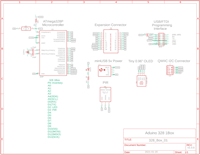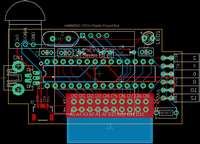|
Aduino (Small Box) ATmega328P SBC |
| PCB Circuits (click to enlarge) | Circuits and Info |
|
Eagle CAD: v1.0 Schematic 1
Eagle CAD: v1.0 Schematic 2
Mini M0 Resources Allocated
(Bill of Materials, modules are not included) |
Overview This is a small weather station designed to fit within a 1.36"W x 2.35"L x 0.79"H plastic box (Hammond 1551H). It has been designed as a dev system thanks to all of the pins ported out to a female connector at the front of the box
Features: - mini PIR motion detector - 20-pin right-angle female header on the frontside of the SBC you may wish to attach to this dev board - 4-wire Qwiic JST connector moved to the front of the board for connection to your I2C devices
Weather Station There are only a few resources installed on the SBC to function as a type of weather station that can provide: - temperature, humidity, barometric pressure, dewpoint and humidex values - display of the current stats
Microcontroller Resources Microchip ATmega328P 5v microcontroller used in the Arduino UNO and here is the pinout. - 16MHz, 32KB Flash for program storage, 2KB dynamic SRAM for global variables, 1KB EEPROM - I2C and SPI serial ports - 5v operation - separate FTDI/USB module needed for programming and serial monitor debugging
I2C Devices like the 0.96" OLED and BME280 sensor utilize I2C for communication. Additional I2C devices can be connected via the tiny STEMMA QT / Qwiic JST SH 4-pin connector on the front left side of the box. Here are links for cables: - https://www.adafruit.com/product/4209 - https://www.adafruit.com/product/4210 -
https://www.adafruit.com/product/4401
SBC Features: - The SBC can be powered via 5v miniUSB connector on the left-hand side - 20-pin expansion connector (D0 to D10) on the front side
Devices/Modules Included: - 128 x 64 0.96" OLED monochrome display - Adafruit-compatible BME280 Temperature/Humidity/Barometric Pressure module - Motion sensing Passive Infrared (PIR) mini sensor, could be used to sense movement to enable the OLED display, etc. - Expansion via the Qwiic JST SH 4-pin I2C connector or the front-side 20-pin connector
Sketches Use the ATmega-specific sketch, ____________________, with this ATmega328P development board. You will need to modify either line 10 or 11: one of them must be commented out with "//", depending on whether your OLED uses the SSD1306 or SH1106 driver.
PCBs have been sent to China for fab. I will post a short video demonstrating operation when the boards return. |
|
|
|
Tags: Arduino-type Microcontroller, ATMega328P

